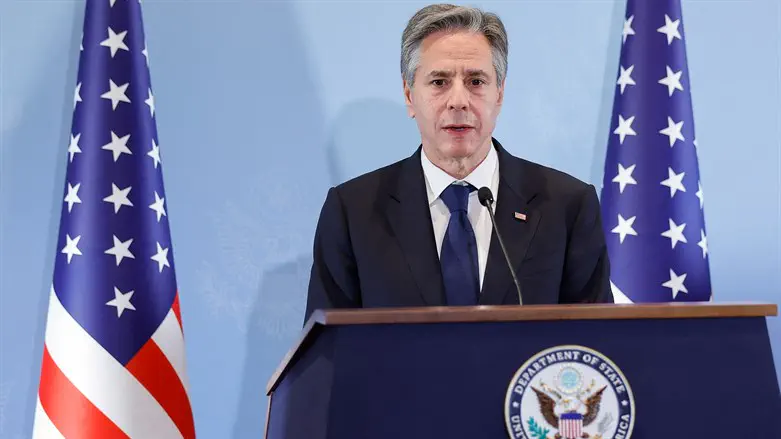
US Secretary of State Antony Blinken expressed optimism on Wednesday that a deal for a ceasefire in Gaza in exchange for the release of hostages was close.
Blinken, who is currently visiting Saudi Arabia, made the comments in an interview with the local channel Al Hadath.
“It’s getting closer. I think the gaps are narrowing, and I think an agreement is very much possible. We worked very hard with Qatar, with Egypt, and with Israel to put a strong proposal on the table. We did that; Hamas wouldn’t accept it. They came back with other requests, other demands. The negotiators are working on that right now. But I believe it’s very much doable, and it’s very much necessary,” he said.
Blinken added that “if Hamas cares at all about the people it purports to represent, then it would reach an agreement, because that would have the immediate effect of a ceasefire, alleviating the tremendous suffering of people, bringing more humanitarian assistance in, and then giving us the possibility of having something more lasting.”
“I’m still hopeful that – more than hopeful that an agreement is possible, and that we can reach it. But it’s urgent, because of course with every day that goes by, more people are suffering. The quickest path – the quickest path to ending that is getting this immediate ceasefire with the release of hostages. Then a lot more becomes possible,” the Secretary of State continued.
“The Israeli team is present [in talks in Qatar], has authority to reach an agreement. A very strong proposal was put on the table, and we have to see if Hamas can say yes to the proposal. If it does – if it does – that’s the most immediate way to alleviate the misery of people in Gaza, which is very much what we want.”
The Secretary of State also stressed that “we stand with Israel and its right to defend itself, to make sure that October 7th never happens again”, but also added that “at the same time, it’s imperative that the civilians who are in harm’s way and who are suffering so terribly – that we focus on them, that we make them a priority, protecting the civilians, getting them humanitarian assistance.”
Blinken was asked about the pier which will provide aid to Gaza, and said he believed it would be completed “in a matter of weeks”.
“But that’s not a substitute for what’s even more important, which is getting assistance through over land, and that means that Israel needs to open up more access points to Gaza. We’ve seen some progress there, including a new access point that was opened just about a week ago. The ones that are already – that already exist, we have to get more assistance through on a regular basis, and all of this is necessary to do it, to make sure that as much assistance as possible is coming in through as many points as possible, reaching as many people as possible.”
On Sunday night, the Political-Security Cabinet approved the departure of the Israeli delegation, headed by Mossad chief David Barnea, to Doha for discussions on the details of the plan for the release of the hostages.
The Cabinet gave the Israeli delegation a general mandate and authorized Prime Minister Benjamin Netanyahu and Defense Minister Yoav Gallant to discuss tactical details.
An official with knowledge of the details said that the delegation "will be able to conduct extensive negotiations".
On Saturday, the Lebanese Al-Akhbar newspaper reported that the first stage of the currently proposed deal would include a 42-day ceasefire, which in the second stage would become permanent.
Hamas is demanding that in the first stage, displaced Gazans would be allowed to return to the northern Gaza Strip and to allow for aid to reach the north and for there to be freedom of movement.
The newspaper also reported that Hamas is demanding the release of 50 terrorists, 30 of whom are serving life sentences, for every living Israeli female soldier, woman, child, elderly, and sick person in captivity.
At the beginning of the second stage, Hamas is demanding the declaration of a permanent ceasefire before any prisoner swap that would include the male soldiers in captivity. In the third stage, the terror organization demands the reconstruction of the entire Gaza Strip.

